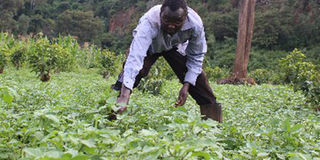Nightshade lights up man’s prospects

Moses Cherita in his farm where he cultivates black nightshade. PHOTO | STANLEY KIMUGE | NATION MEDIA GROUP
What you need to know:
- Black nightshade, compared to maize, gives better returns.
- For every acre, he can harvest between 250 to 300 bags of the vegetables, which finds its way to Eldoret, Iten and Kabarnet towns of the North Rift region.
- Black nightshade’s seeds are first planted in a seedbed to sprout and are ready for transplant after two weeks.
- After the plant has matured, he plucks the fruits then removes the seeds which he dries under the sun for days.
Maize and beans sway to the cool breeze in adjacent farms on the slopes of Kessup Village in Keiyo North, Elgeyo-Marakwet County.
But on Moses Cherita’s farm, it is a two-acre spread of green that welcomes us.
Cherita’s face is partially concealed by the teeming black nightshade plants in one end of the farm as he uproots weeds.
When he sees us, the 30-year-old farmer, renowned for his nightshade popularly known as managu rises to upright position and motions us to his location.
“I started by planting maize but with the erratic rains I realised poor harvests. I later planted snow peas for six months as there was a company that was buying them for export market,” says the farmer after greetings.
He would later quit the venture due to lack of market for the produce and turn his sights on onions and vegetable cultivation.
That is how he ended up growing the black nightshade, green collards and onions, and has never looked back since then.
“Black nightshade, compared to maize, gives better returns. For instance, when you plant maize, you have to wait the whole year to harvest unlike the indigenous vegetable which is ready for maturity after one month,” said the father of two, who dropped out school in Form Two due to lack of school fees.
Maize goes for Sh2,300 per 90kg bag at the National Cereals and Produce Board while the brokers who take advantage of the farmers can purchase it for as low as Sh1,200.
“But I sell a bag between Sh1,500 and Sh4,500 depending on the time of the year. During the dry spell, when there is scarcity of the vegetables, I sell between Sh3,000 and Sh4,500 as the demand, is high” he says.
DRIP IRRIGATION
For every acre, he can harvest between 250 to 300 bags of the vegetables, which finds its way to Eldoret, Iten and Kabarnet towns of the North Rift region.
According to the farmer, one can harvest up to six times a year so long as he adds fertiliser to ensure they continue to flourish.
“I buy two bags of the CAN and DAP for every one acre, and for every acre I apply 100 kilos. I also apply the fertiliser after starting to harvest to ensure I continuously harvest the crop,” he notes.
(Read also: Meet the professor of indigenous vegetables)
Black nightshade’s seeds are first planted in a seedbed to sprout and are ready for transplant after two weeks. It requires plenty of water and manure at this juncture. He weeds after every three weeks to guarantee bumper harvest.
Apart from the notorious bacterial wilt, Cherita who grows in an open field encounters the water challenge during dry season. Too much rain can also end up destroying the crop especially when under the seedbed in the wet season.
“The wilt makes the leaves and the roots rot. I try to reduce the risk by practicing crop rotation. I grow onions after seven months on the same field.”
As a vegetable that requires water, he draws the commodity underground and uses the drip irrigation especially during the dry season.
After the plant has matured, he plucks the fruits then removes the seeds which he dries under the sun for days.
“Those who have shown interest have been coming here to learn how to grow. And people are turning to this vegetables due to its nutritional value,” says the farmer.
The farmer has leased four more acres for Sh10,000 per acre for a year to expand the business.





